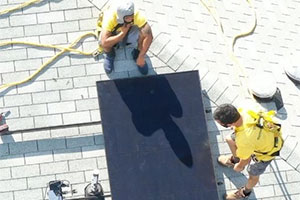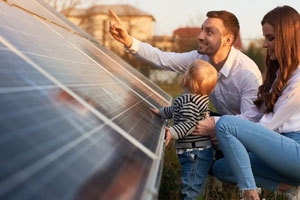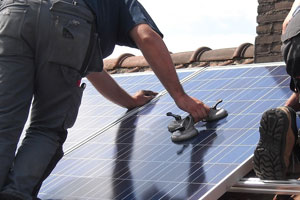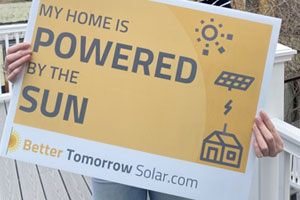How Easy Is a Solar Panel Installation?
Solar panel installation is easy. The average actual installation on a home roof takes about three to four days as long as there is good weather. Please note there is more than just installing the panels on the roof. There is the process of interconnecting to the utility, but most large utilities now have plenty of experience in connecting customers.
Solar is easy! So, should your panel installation be
The mechanics of solar energy are simple. You have a panel that collects sunshine. The sunshine gets transformed into electric energy which in turn gets transferred into your home for use. Installing panels is a construction process and like all construction processes, it is buyer beware. That is why when you choose a solar company you should choose a solar company with NABCEP certified staff. Sure, your local electrician might be able to say he can do it but there is more than hooking up the panels to your electrical box. There are micro-inverters, wind-tested mounting systems, location on the roof for maximum production, and local building codes to consider. That is why choosing a local solar company is your best bet for a positive experience and the best functioning system possible. Experience really does matter.
Choose the right solar panel installation company
Not all solar installation companies are the same. Some are local and some are from out of state. Some are bigger and some are more personal. Some are customer centered and others go for volume. Some are motivated primarily by an environmental mission and others are more profit driven. Some will offer workmanship warranties and others rely simply on product performance warranties. Some practice what they preach in that the roofs on their office and principal’s home are blanketed with solar arrays and others sell solar to others but do not seem to value it themselves. Some are committed to an all-electric fleet of trucks as soon as they are available and others have no such plans. Some have a goal of actively seeking and cultivating a qualified diverse workforce and others are not terribly interested in that. Some are female-owned and lead and others are not.
Solar Panel Installation: the devil is in the details
Like all home improvement projects, there are a lot of details. First, there is the question of solar feasibility. Is the proposed site, whether on a rooftop or on the ground, feasible for solar installation? Is there enough unobstructed sunshine during the day to produce a decent number of kilowatts of electricity?
We at Better Tomorrow Solar understand the importance of this first step. In tree-covered Georgia, this is not a given. We use advanced software with satellite imagery and careful site evaluation visits to make sure solar will pay off for the customer. Once feasibility is determined, we draft a proposal detailing the size, placement, output, or production of the system. The placement of the array is carefully checked by different people to make sure that we have maximum power generation. We have seen lots of designs from other companies that place panels where it is most convenient for their installers, or with no thought to solar irradiance which can vary significantly on the same roof.
Once the plan is completed, we carefully go over the financing options and the payback of the system with the customers. The customer must be satisfied with the size, placement, and output of the proposed system. Then our engineers start drawing complete and detailed plans that will be submitted to the jurisdiction with authority over the site. The process of completing the plans requires the project manager and installation crew lead’s approval before they are sent out for a final review and approval by the customer. Finally, the plans are ready for submission to the relevant authority. At the same time, we prepare the list of materials and issue purchase orders to our vendors. We start the paperwork for interconnection with the utility to make sure they are kept informed of the scope of our project. As there are over forty different electric power companies in Georgia, each with different requirements for interconnecting, we do not want to be surprised at the end of the project.
With the permit in hand and materials ready, we schedule the installation day with the customer. Already familiar with the layout of the solar panels and the other components of the system, the crew leader assigns tasks to the members and the installation begins. The work on the roof usually takes one to two days. Work on steep or high roofs may be slower. The electrical work of tying in the system with the house and the grid will have to be done by our State-licensed electrician once all the solar panels are installed and connected. That work typically takes the better part of another day. When the electrician is done, the system will start producing electricity. We will set up monitoring so the customer can see how much clean solar power is being produced. This part, where the customer first sees that his or her solar panels are really producing electricity, never gets tiring for us. But the job is not yet complete.
The building authority of the customer’s City or County requires an inspection of the completed system. The interconnection process with the utility is the final step and can only be done after the jurisdictional authority sends them a notice that the system has passed inspection.
Solar Panel Installation: Best done by dedicated solar companies
Sometimes customers hire an electrician or a roofer to install solar systems on their roofs. Or even worse: they sometimes hire framers or general contractors to install solar panels. While solar panel installation involves some of the skills roofers and electricians have, it is much more than that. Of course, those tradespeople can be trained to install solar systems. But merely having roofing or electrical experience does not mean you are qualified to install solar. As we said, an important part of a successful solar system starts before the installation. A well-designed, well-placed solar system will make a world of difference. We at Better Tomorrow Solar, use the latest technology powered by solar irradiance data continuously updated by satellites. We use high-definition imagery and LIDAR to measure areas and the height of obstructions such as trees. Armed with this information we compile shade reports to carefully place panels for maximum production. Few roofers, electricians, or framers have access to such information.
A well-designed system has components whose capacities are calculated not to exceed each other capacities. A competent electrician may, but not necessarily, be able to perform those calculations. A roofer, unless also trained as a solar professional, will not. Neither of course will framers nor general contractors.
None of the other tradespeople can do all of what is required to install solar systems unless they have had separate training (formal or informal) in solar installation.
And the same is true for an electrical engineer who may know a great deal about electricity. Such an engineer may be able to calculate whether the components of a solar system are compatible. However, she does not have any experience with key solar design concepts such as the tilt of panels in relation to latitude, solar azimuth angles, or irradiance, unless she has had additional solar training.
Do choose a solar panel installation company that has NABCEP certification
All the mentioned specialists may know many more aspects of their trade, but only a solar professional knows all the various aspects of solar design and installation. The North American Board of Certified Energy Professionals (NABCEP) certifies solar professionals through rigorous testing and job installation verifications. Once certified, solar professionals must meet continuing education requirements to maintain their status. We at Better Tomorrow Solar hire NABCEP-certified professionals and enthusiastically support and encourage the training and certification of employees who seek professional certification.
Don’t choose a solar installation company that does not carry panels that don’t have a warranty
The subject of warranties is complex. We will deal with it more extensively separately. Suffice it to say here that there are different kinds of warranties and even when it comes to the same kind of warranty not all of them are the same.
When shopping for solar systems you need to ask about three different kinds of warranties:
- Performance, or power output, warranty on the main components of the system, such as the solar panels;
- Workmanship warranty on the main components of the system, such as the solar panels; and,
- Labor workmanship warranty on the installation of the system.
- Solar panels naturally degrade a small amount annually. The rate of degradation is small, at about 0.5% per year on average. Reputable manufacturers of tier-1 components provide a warranty to assure customers that their panels will not degrade further. This is called a performance warranty. It is a guarantee that the power output of the panel at the end of the warranty period—usually 20 to 25 years—will be at a certain percent of what it was rated at the beginning—usually 80% to 85%. After 20 to 25 years of life, in other words, the panel is warranted to degrade at most 15% to 20%. With no moving parts, panels of course go on producing years after the end of their performance warranties.
- Aside from power output, panels and other components of solar systems, are warrantied against defects in design, material, and workmanship. These warranties usually are 10 to 12 years on panels and 5 to 7 on inverters.
- In addition to components, the solar installer may offer a warranty against defective installation. Most solar companies offer one or two-year warranties. Better Tomorrow Solar’s industry-leading labor warranty is for six years.







